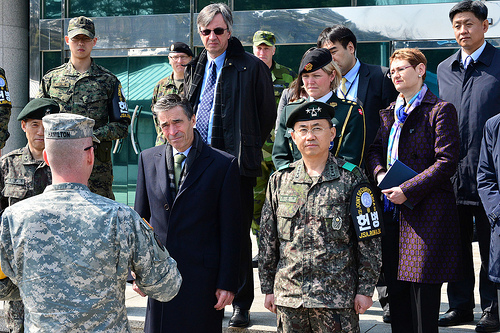
From Richard Weitz, World Policy Review: NATO Secretary-General Anders Fogh Rasmussen recently undertook a week-long visit to Japan and South Korea, highlighting NATO’s growing role in Asian security in partnership with nonmember governments. Rasmussen is convinced that NATO needs to deepen cooperation with partner states to address global security issues that can negatively impact NATO members’ security. Conversely, NATO has unique capabilities and experience in leading multinational military campaigns, as in Afghanistan and Libya, which can be applied to joint efforts among NATO and partner states to address security concerns in Asia and beyond. . . .
NATO’s updated Strategic Concept adopted at the November 2010 Lisbon summit calls on the alliance to become more versatile to counter novel dangers from sources that are geographically and technologically diverse, in particular by expanding partnerships with nonmember states. The approach “offers [the alliance’s] partners around the globe more political engagement with the alliance, and a substantial role in shaping the NATO-led operations to which they contribute. . . .”
The increased emphasis on seeking partnerships with other countries and international institutions is in part due to the strain on NATO’s resources and the stalling of enlargement. Thousands of troops from partner countries support NATO’s efforts in Afghanistan and in the Balkans, while in Libya, for the first time, Arab state partners conducted strike missions in support of NATO. Partners also contribute financially to NATO activities; manage their internal and regional security challenges to address potential transnational threats to NATO countries; and add political support and legitimacy to NATO-led military operations.
Despite the problems with some of these operations, NATO leaders can convincingly point to them as evidence that the alliance is the only multinational security institution capable of conducting sustained high-intensity combat operations outside its traditional area of operations. NATO can pool together North American and European military assets as well as incorporate contributions from various partners. Although NATO could undertake many operations unilaterally, having foreign partners is convenient for sharing the burden of an operation and, even more so, for enhancing its international legitimacy. . . .
On his recent trip, Rasmussen insisted that NATO wanted to contribute to Asian security, in partnership with Asian actors, but not have a permanent military presence in Asia. That may not be enough to reassure Chinese and Russian officials who worry that the alliance might be used as part of a U.S.-led global containment strategy against them, such as by siding with Japan in its territorial disputes with Beijing and Moscow.
Nevertheless, while NATO has adopted a global perspective, its main activities beyond Europe and Afghanistan thus far have consisted primarily of dialogue and, as in the special case of the Gulf of Aden, joint defensive measures with other security institutions under a U.N. mandate. NATO explicitly acknowledges the unique role of the United Nations and stresses that the alliance wants to partner with it and other international institutions rather than displace them. Whether this approach can be successfully applied to Asia’s complex regional security landscape remains to be seen.
Richard Weitz is a senior fellow at the Hudson Institute and a World Politics Review senior editor. (photo: NATO)
Image: nato%204%2016%2013%20SKorea%20DMZ.jpg
